An Analysis of the Olympus Scandal: Auditing Theory and Practice
VerifiedAdded on 2020/05/28
|8
|1830
|169
Report
AI Summary
This report provides a detailed analysis of the Olympus scandal, a significant case of financial fraud that occurred within the renowned optical equipment manufacturer. The report examines the fraudulent activities, including the concealment of substantial investment losses over an extended period. It delves into the roles and responsibilities of the auditors, specifically KPMG and Ernst & Young, in relation to the scandal, evaluating their performance and potential failures in detecting or preventing the fraud. The report also explores the ethical dilemmas faced by individuals involved, such as the conflict between integrity and loyalty, and discusses the impact of the scandal on corporate governance and auditing practices. Furthermore, the report considers the implications of the Sarbanes-Oxley Act in the context of the Olympus scandal, highlighting the importance of regulatory oversight in preventing such fraudulent activities. The study concludes by emphasizing the crucial role of auditors in ensuring financial statement integrity and safeguarding stakeholder interests.

Running head: AUDITING THEORY AND PRACTICE
Auditing Theory and Practice
Name of the Student:
Name of the University:
Author Note
Auditing Theory and Practice
Name of the Student:
Name of the University:
Author Note
Paraphrase This Document
Need a fresh take? Get an instant paraphrase of this document with our AI Paraphraser
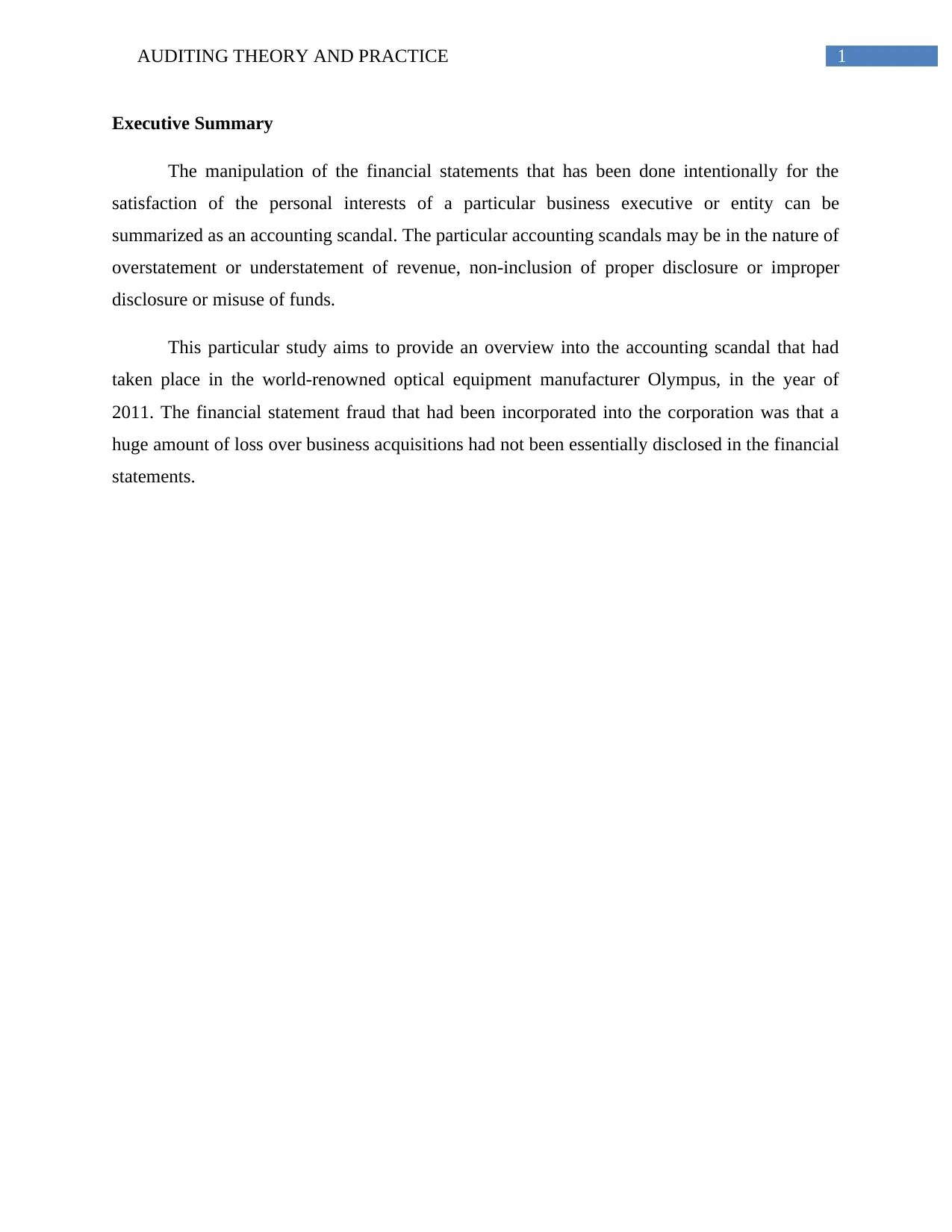
1AUDITING THEORY AND PRACTICE
Executive Summary
The manipulation of the financial statements that has been done intentionally for the
satisfaction of the personal interests of a particular business executive or entity can be
summarized as an accounting scandal. The particular accounting scandals may be in the nature of
overstatement or understatement of revenue, non-inclusion of proper disclosure or improper
disclosure or misuse of funds.
This particular study aims to provide an overview into the accounting scandal that had
taken place in the world-renowned optical equipment manufacturer Olympus, in the year of
2011. The financial statement fraud that had been incorporated into the corporation was that a
huge amount of loss over business acquisitions had not been essentially disclosed in the financial
statements.
Executive Summary
The manipulation of the financial statements that has been done intentionally for the
satisfaction of the personal interests of a particular business executive or entity can be
summarized as an accounting scandal. The particular accounting scandals may be in the nature of
overstatement or understatement of revenue, non-inclusion of proper disclosure or improper
disclosure or misuse of funds.
This particular study aims to provide an overview into the accounting scandal that had
taken place in the world-renowned optical equipment manufacturer Olympus, in the year of
2011. The financial statement fraud that had been incorporated into the corporation was that a
huge amount of loss over business acquisitions had not been essentially disclosed in the financial
statements.
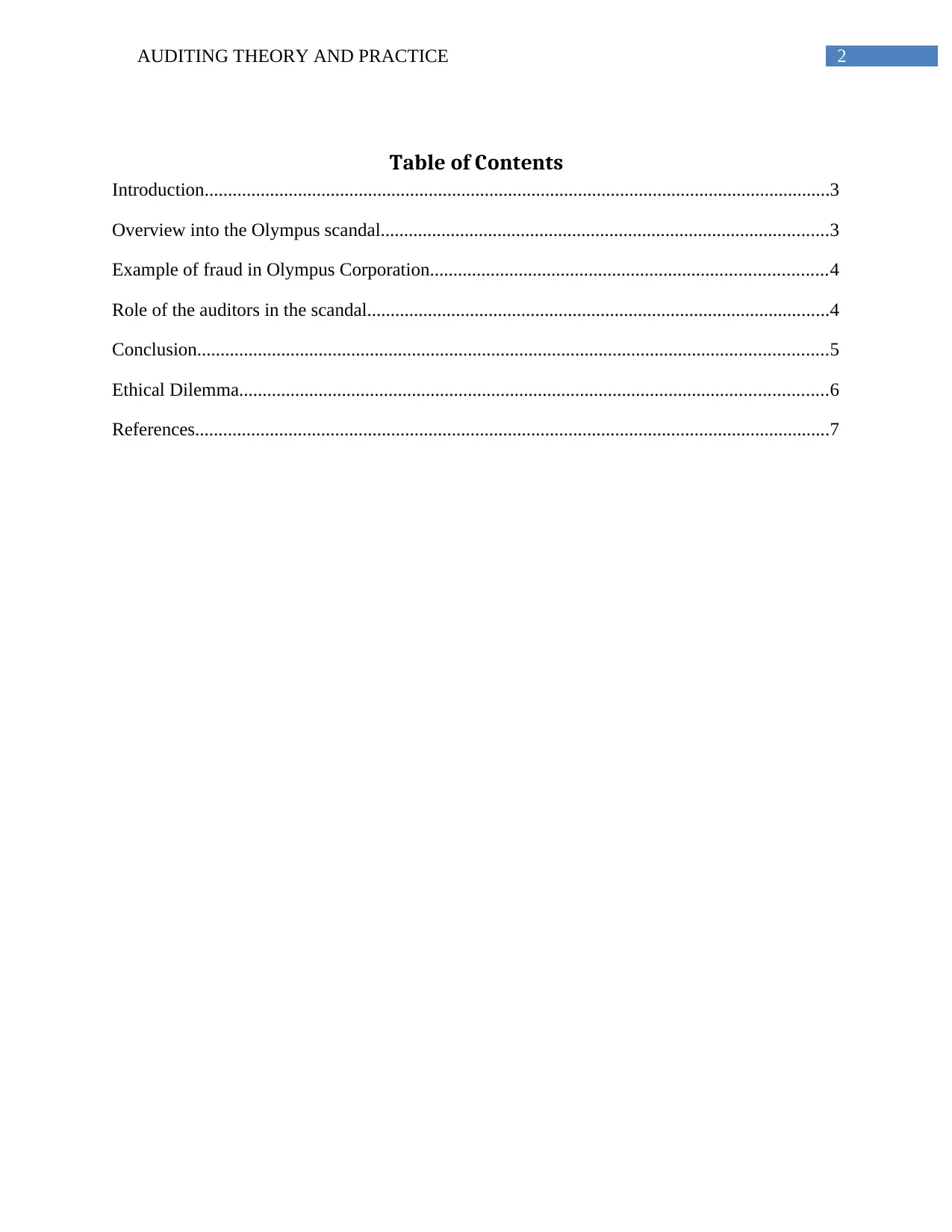
2AUDITING THEORY AND PRACTICE
Table of Contents
Introduction......................................................................................................................................3
Overview into the Olympus scandal................................................................................................3
Example of fraud in Olympus Corporation.....................................................................................4
Role of the auditors in the scandal...................................................................................................4
Conclusion.......................................................................................................................................5
Ethical Dilemma..............................................................................................................................6
References........................................................................................................................................7
Table of Contents
Introduction......................................................................................................................................3
Overview into the Olympus scandal................................................................................................3
Example of fraud in Olympus Corporation.....................................................................................4
Role of the auditors in the scandal...................................................................................................4
Conclusion.......................................................................................................................................5
Ethical Dilemma..............................................................................................................................6
References........................................................................................................................................7
⊘ This is a preview!⊘
Do you want full access?
Subscribe today to unlock all pages.

Trusted by 1+ million students worldwide
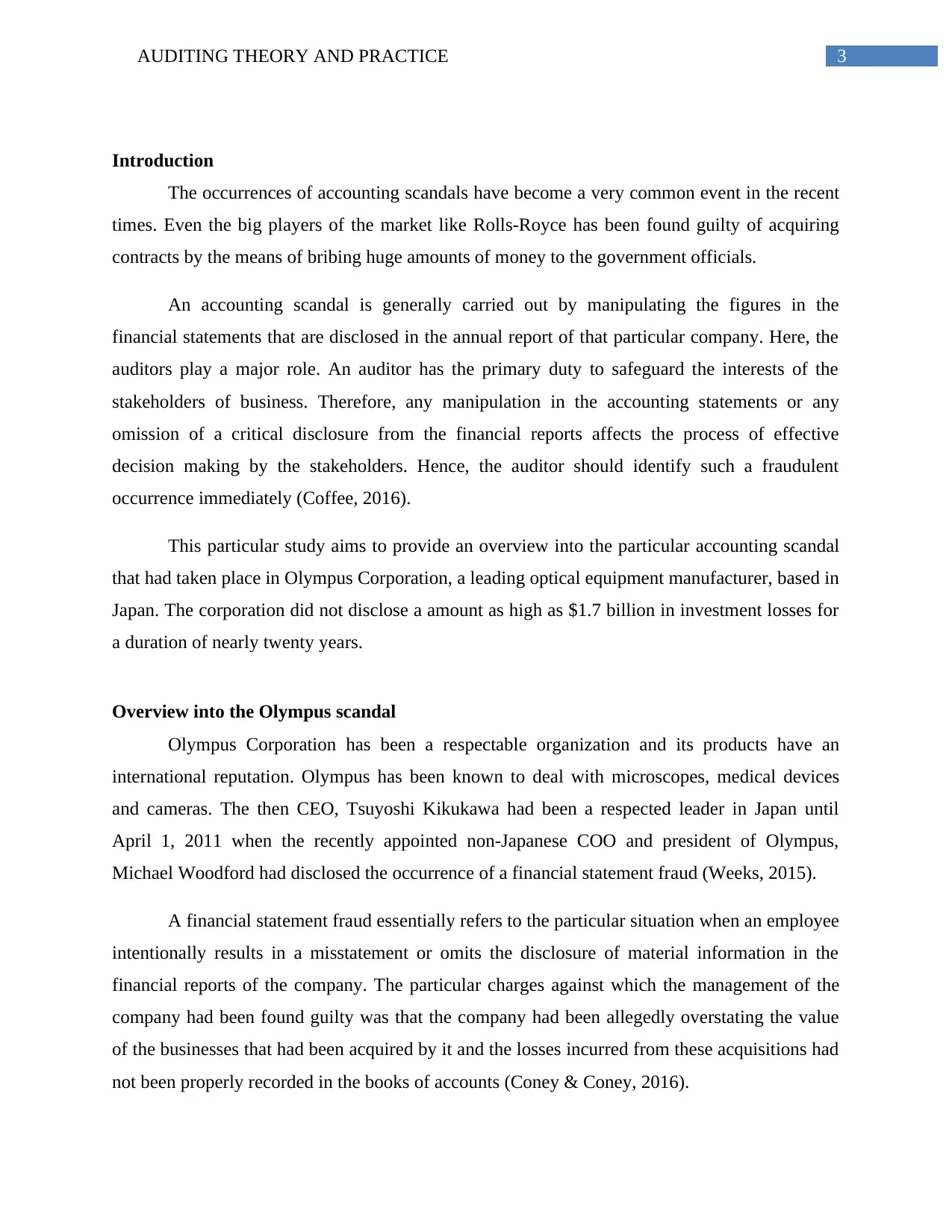
3AUDITING THEORY AND PRACTICE
Introduction
The occurrences of accounting scandals have become a very common event in the recent
times. Even the big players of the market like Rolls-Royce has been found guilty of acquiring
contracts by the means of bribing huge amounts of money to the government officials.
An accounting scandal is generally carried out by manipulating the figures in the
financial statements that are disclosed in the annual report of that particular company. Here, the
auditors play a major role. An auditor has the primary duty to safeguard the interests of the
stakeholders of business. Therefore, any manipulation in the accounting statements or any
omission of a critical disclosure from the financial reports affects the process of effective
decision making by the stakeholders. Hence, the auditor should identify such a fraudulent
occurrence immediately (Coffee, 2016).
This particular study aims to provide an overview into the particular accounting scandal
that had taken place in Olympus Corporation, a leading optical equipment manufacturer, based in
Japan. The corporation did not disclose a amount as high as $1.7 billion in investment losses for
a duration of nearly twenty years.
Overview into the Olympus scandal
Olympus Corporation has been a respectable organization and its products have an
international reputation. Olympus has been known to deal with microscopes, medical devices
and cameras. The then CEO, Tsuyoshi Kikukawa had been a respected leader in Japan until
April 1, 2011 when the recently appointed non-Japanese COO and president of Olympus,
Michael Woodford had disclosed the occurrence of a financial statement fraud (Weeks, 2015).
A financial statement fraud essentially refers to the particular situation when an employee
intentionally results in a misstatement or omits the disclosure of material information in the
financial reports of the company. The particular charges against which the management of the
company had been found guilty was that the company had been allegedly overstating the value
of the businesses that had been acquired by it and the losses incurred from these acquisitions had
not been properly recorded in the books of accounts (Coney & Coney, 2016).
Introduction
The occurrences of accounting scandals have become a very common event in the recent
times. Even the big players of the market like Rolls-Royce has been found guilty of acquiring
contracts by the means of bribing huge amounts of money to the government officials.
An accounting scandal is generally carried out by manipulating the figures in the
financial statements that are disclosed in the annual report of that particular company. Here, the
auditors play a major role. An auditor has the primary duty to safeguard the interests of the
stakeholders of business. Therefore, any manipulation in the accounting statements or any
omission of a critical disclosure from the financial reports affects the process of effective
decision making by the stakeholders. Hence, the auditor should identify such a fraudulent
occurrence immediately (Coffee, 2016).
This particular study aims to provide an overview into the particular accounting scandal
that had taken place in Olympus Corporation, a leading optical equipment manufacturer, based in
Japan. The corporation did not disclose a amount as high as $1.7 billion in investment losses for
a duration of nearly twenty years.
Overview into the Olympus scandal
Olympus Corporation has been a respectable organization and its products have an
international reputation. Olympus has been known to deal with microscopes, medical devices
and cameras. The then CEO, Tsuyoshi Kikukawa had been a respected leader in Japan until
April 1, 2011 when the recently appointed non-Japanese COO and president of Olympus,
Michael Woodford had disclosed the occurrence of a financial statement fraud (Weeks, 2015).
A financial statement fraud essentially refers to the particular situation when an employee
intentionally results in a misstatement or omits the disclosure of material information in the
financial reports of the company. The particular charges against which the management of the
company had been found guilty was that the company had been allegedly overstating the value
of the businesses that had been acquired by it and the losses incurred from these acquisitions had
not been properly recorded in the books of accounts (Coney & Coney, 2016).
Paraphrase This Document
Need a fresh take? Get an instant paraphrase of this document with our AI Paraphraser
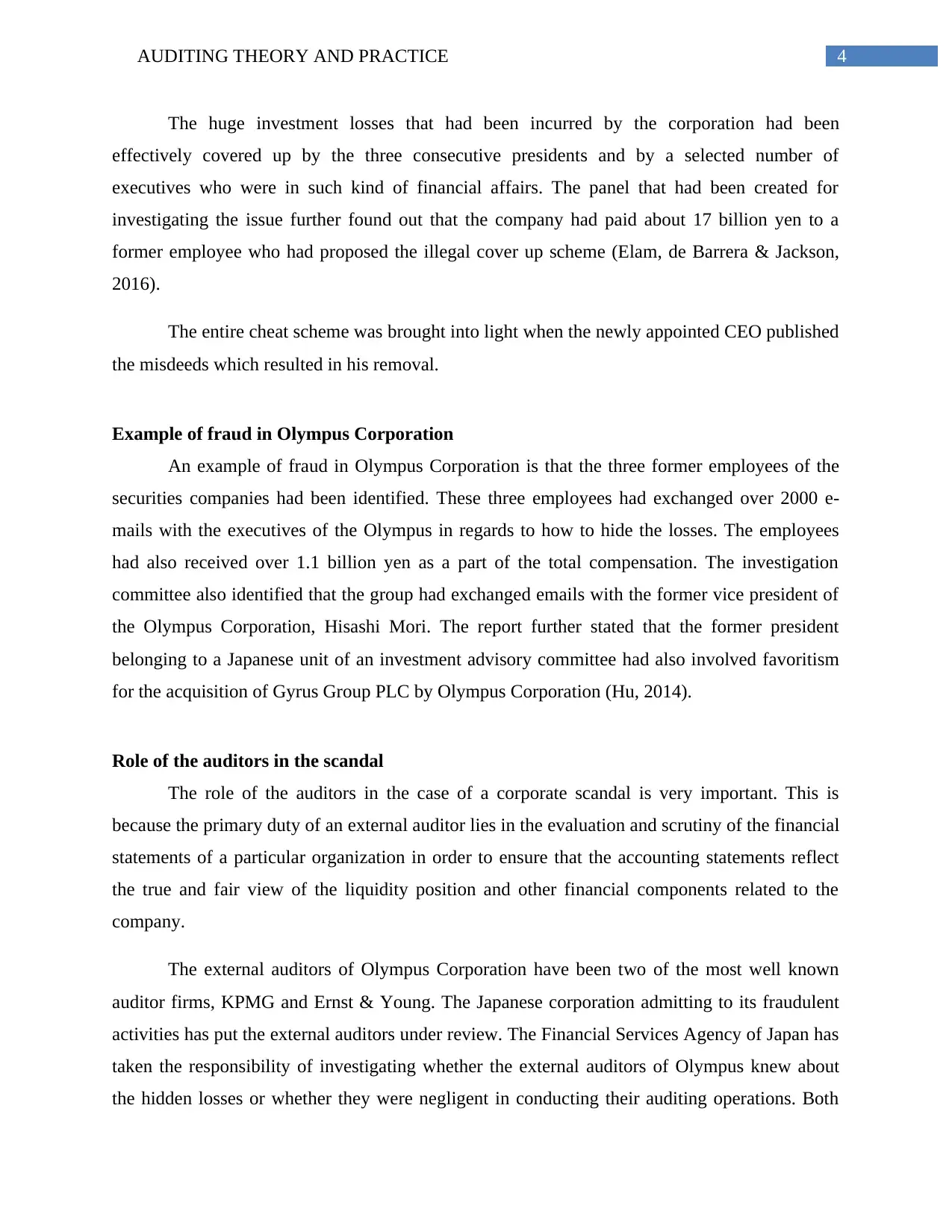
4AUDITING THEORY AND PRACTICE
The huge investment losses that had been incurred by the corporation had been
effectively covered up by the three consecutive presidents and by a selected number of
executives who were in such kind of financial affairs. The panel that had been created for
investigating the issue further found out that the company had paid about 17 billion yen to a
former employee who had proposed the illegal cover up scheme (Elam, de Barrera & Jackson,
2016).
The entire cheat scheme was brought into light when the newly appointed CEO published
the misdeeds which resulted in his removal.
Example of fraud in Olympus Corporation
An example of fraud in Olympus Corporation is that the three former employees of the
securities companies had been identified. These three employees had exchanged over 2000 e-
mails with the executives of the Olympus in regards to how to hide the losses. The employees
had also received over 1.1 billion yen as a part of the total compensation. The investigation
committee also identified that the group had exchanged emails with the former vice president of
the Olympus Corporation, Hisashi Mori. The report further stated that the former president
belonging to a Japanese unit of an investment advisory committee had also involved favoritism
for the acquisition of Gyrus Group PLC by Olympus Corporation (Hu, 2014).
Role of the auditors in the scandal
The role of the auditors in the case of a corporate scandal is very important. This is
because the primary duty of an external auditor lies in the evaluation and scrutiny of the financial
statements of a particular organization in order to ensure that the accounting statements reflect
the true and fair view of the liquidity position and other financial components related to the
company.
The external auditors of Olympus Corporation have been two of the most well known
auditor firms, KPMG and Ernst & Young. The Japanese corporation admitting to its fraudulent
activities has put the external auditors under review. The Financial Services Agency of Japan has
taken the responsibility of investigating whether the external auditors of Olympus knew about
the hidden losses or whether they were negligent in conducting their auditing operations. Both
The huge investment losses that had been incurred by the corporation had been
effectively covered up by the three consecutive presidents and by a selected number of
executives who were in such kind of financial affairs. The panel that had been created for
investigating the issue further found out that the company had paid about 17 billion yen to a
former employee who had proposed the illegal cover up scheme (Elam, de Barrera & Jackson,
2016).
The entire cheat scheme was brought into light when the newly appointed CEO published
the misdeeds which resulted in his removal.
Example of fraud in Olympus Corporation
An example of fraud in Olympus Corporation is that the three former employees of the
securities companies had been identified. These three employees had exchanged over 2000 e-
mails with the executives of the Olympus in regards to how to hide the losses. The employees
had also received over 1.1 billion yen as a part of the total compensation. The investigation
committee also identified that the group had exchanged emails with the former vice president of
the Olympus Corporation, Hisashi Mori. The report further stated that the former president
belonging to a Japanese unit of an investment advisory committee had also involved favoritism
for the acquisition of Gyrus Group PLC by Olympus Corporation (Hu, 2014).
Role of the auditors in the scandal
The role of the auditors in the case of a corporate scandal is very important. This is
because the primary duty of an external auditor lies in the evaluation and scrutiny of the financial
statements of a particular organization in order to ensure that the accounting statements reflect
the true and fair view of the liquidity position and other financial components related to the
company.
The external auditors of Olympus Corporation have been two of the most well known
auditor firms, KPMG and Ernst & Young. The Japanese corporation admitting to its fraudulent
activities has put the external auditors under review. The Financial Services Agency of Japan has
taken the responsibility of investigating whether the external auditors of Olympus knew about
the hidden losses or whether they were negligent in conducting their auditing operations. Both

5AUDITING THEORY AND PRACTICE
KPMG and Ernst & Young had declined to comment on the issues pertaining to the protection of
customer data. The fact that KPMG had been removed as a group auditor in 2009 evidently
states that the there had been certain issues that had led to disagreements between the audit firm
and its client. As per the reports, the optical equipment manufacture company had certain
controversies with KPMG in regards to certain controversial acquisitions, which ultimately led to
the removal of the audit firm (Jackson, 2017).
Next, Ernst & Young had been hired for the audit of Olympus Corporation since 2009.
There have been subsequent evidences in regards to the fraudulent actions that have been carried
out by the corporation but the auditing firms did not take subsequent actions in publishing the
corrupted culture of the conglomerate. Both the firms in the cases of unfair acquisition of the
British medical firm, Gyrus in 2008 had raised questions. The fact that Olympus had made a
payment of $687 million in regards to the advisory fees that accounted for one third of the
purchase price would be hint enough to identify the corruption in the senior level management of
the firm. However, both KPMG and Ernst & Young after raising certain questions, dropped the
issue and gave the company a clean bill (Tsai, 2015).
This has been an issue lack of auditing capability. This means that the auditor has not
properly focused on the auditing procedures that are to be followed in order to carry out a proper
auditing procedure. In order to adhere to the ISA 240, the auditor should prioritize the risks of
material misstatements in the financial reports due to fraud. Thus, both the audit firms have not
adhered to the auditing standards. The firm has also violates the agency theory and the signaling
theory (Rahman & Bremer, 2016).
Such scandals like these had resulted in the Congress passing the Sarbanes Oxley Act.
This did create the Public Company Accounting Oversight Board and resulted in the passing of
the control of the accounting regulations out of the hands of the Certified Public Accountants
(Askary, 2017).
Conclusion
Thus, as it can be concluded from the literature that has been discussed in the preceding
paragraphs, the role of an auditor is very important in ensuring that the financial statements of
the firm has been prepared in accordance to the standards of integrity. The primary duty of the
KPMG and Ernst & Young had declined to comment on the issues pertaining to the protection of
customer data. The fact that KPMG had been removed as a group auditor in 2009 evidently
states that the there had been certain issues that had led to disagreements between the audit firm
and its client. As per the reports, the optical equipment manufacture company had certain
controversies with KPMG in regards to certain controversial acquisitions, which ultimately led to
the removal of the audit firm (Jackson, 2017).
Next, Ernst & Young had been hired for the audit of Olympus Corporation since 2009.
There have been subsequent evidences in regards to the fraudulent actions that have been carried
out by the corporation but the auditing firms did not take subsequent actions in publishing the
corrupted culture of the conglomerate. Both the firms in the cases of unfair acquisition of the
British medical firm, Gyrus in 2008 had raised questions. The fact that Olympus had made a
payment of $687 million in regards to the advisory fees that accounted for one third of the
purchase price would be hint enough to identify the corruption in the senior level management of
the firm. However, both KPMG and Ernst & Young after raising certain questions, dropped the
issue and gave the company a clean bill (Tsai, 2015).
This has been an issue lack of auditing capability. This means that the auditor has not
properly focused on the auditing procedures that are to be followed in order to carry out a proper
auditing procedure. In order to adhere to the ISA 240, the auditor should prioritize the risks of
material misstatements in the financial reports due to fraud. Thus, both the audit firms have not
adhered to the auditing standards. The firm has also violates the agency theory and the signaling
theory (Rahman & Bremer, 2016).
Such scandals like these had resulted in the Congress passing the Sarbanes Oxley Act.
This did create the Public Company Accounting Oversight Board and resulted in the passing of
the control of the accounting regulations out of the hands of the Certified Public Accountants
(Askary, 2017).
Conclusion
Thus, as it can be concluded from the literature that has been discussed in the preceding
paragraphs, the role of an auditor is very important in ensuring that the financial statements of
the firm has been prepared in accordance to the standards of integrity. The primary duty of the
⊘ This is a preview!⊘
Do you want full access?
Subscribe today to unlock all pages.

Trusted by 1+ million students worldwide
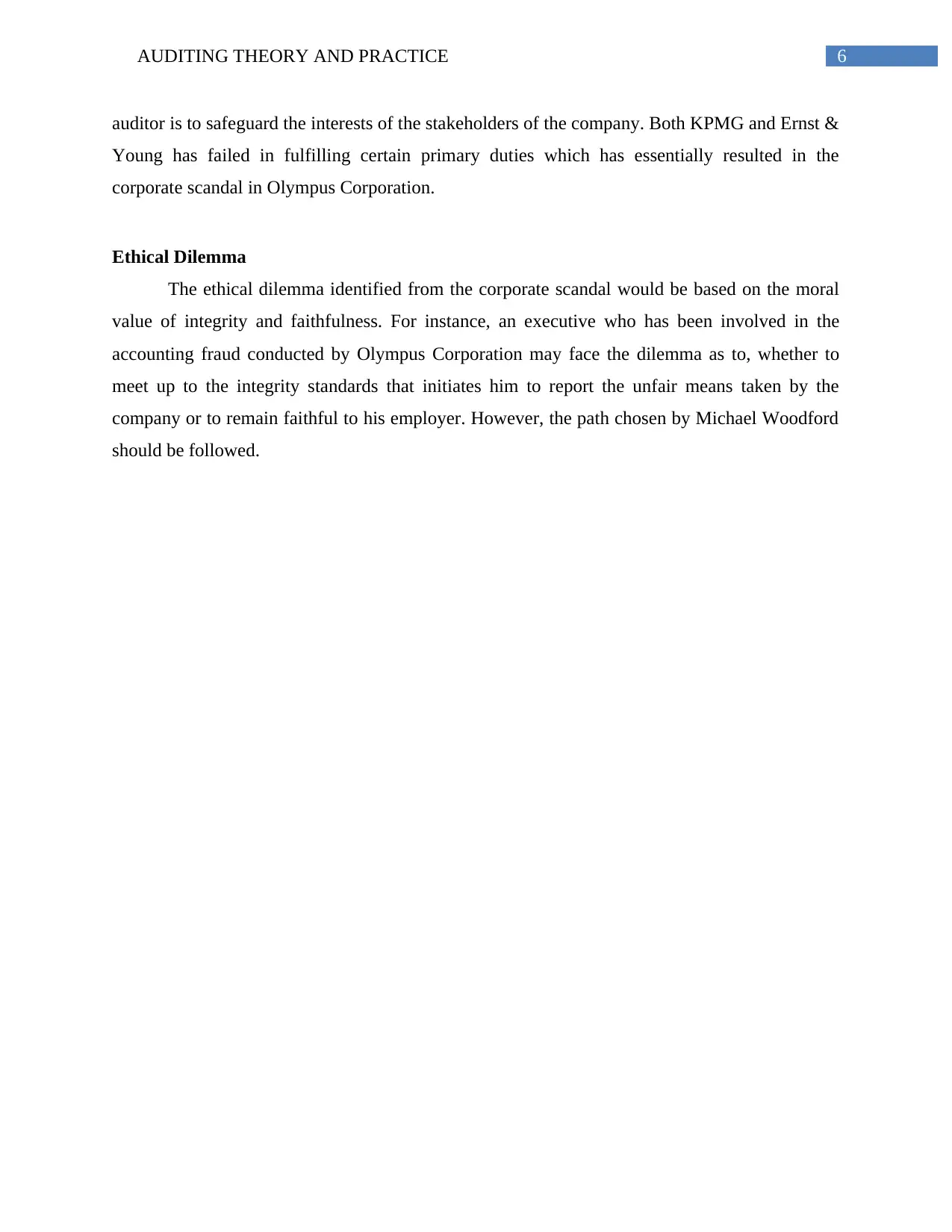
6AUDITING THEORY AND PRACTICE
auditor is to safeguard the interests of the stakeholders of the company. Both KPMG and Ernst &
Young has failed in fulfilling certain primary duties which has essentially resulted in the
corporate scandal in Olympus Corporation.
Ethical Dilemma
The ethical dilemma identified from the corporate scandal would be based on the moral
value of integrity and faithfulness. For instance, an executive who has been involved in the
accounting fraud conducted by Olympus Corporation may face the dilemma as to, whether to
meet up to the integrity standards that initiates him to report the unfair means taken by the
company or to remain faithful to his employer. However, the path chosen by Michael Woodford
should be followed.
auditor is to safeguard the interests of the stakeholders of the company. Both KPMG and Ernst &
Young has failed in fulfilling certain primary duties which has essentially resulted in the
corporate scandal in Olympus Corporation.
Ethical Dilemma
The ethical dilemma identified from the corporate scandal would be based on the moral
value of integrity and faithfulness. For instance, an executive who has been involved in the
accounting fraud conducted by Olympus Corporation may face the dilemma as to, whether to
meet up to the integrity standards that initiates him to report the unfair means taken by the
company or to remain faithful to his employer. However, the path chosen by Michael Woodford
should be followed.
Paraphrase This Document
Need a fresh take? Get an instant paraphrase of this document with our AI Paraphraser
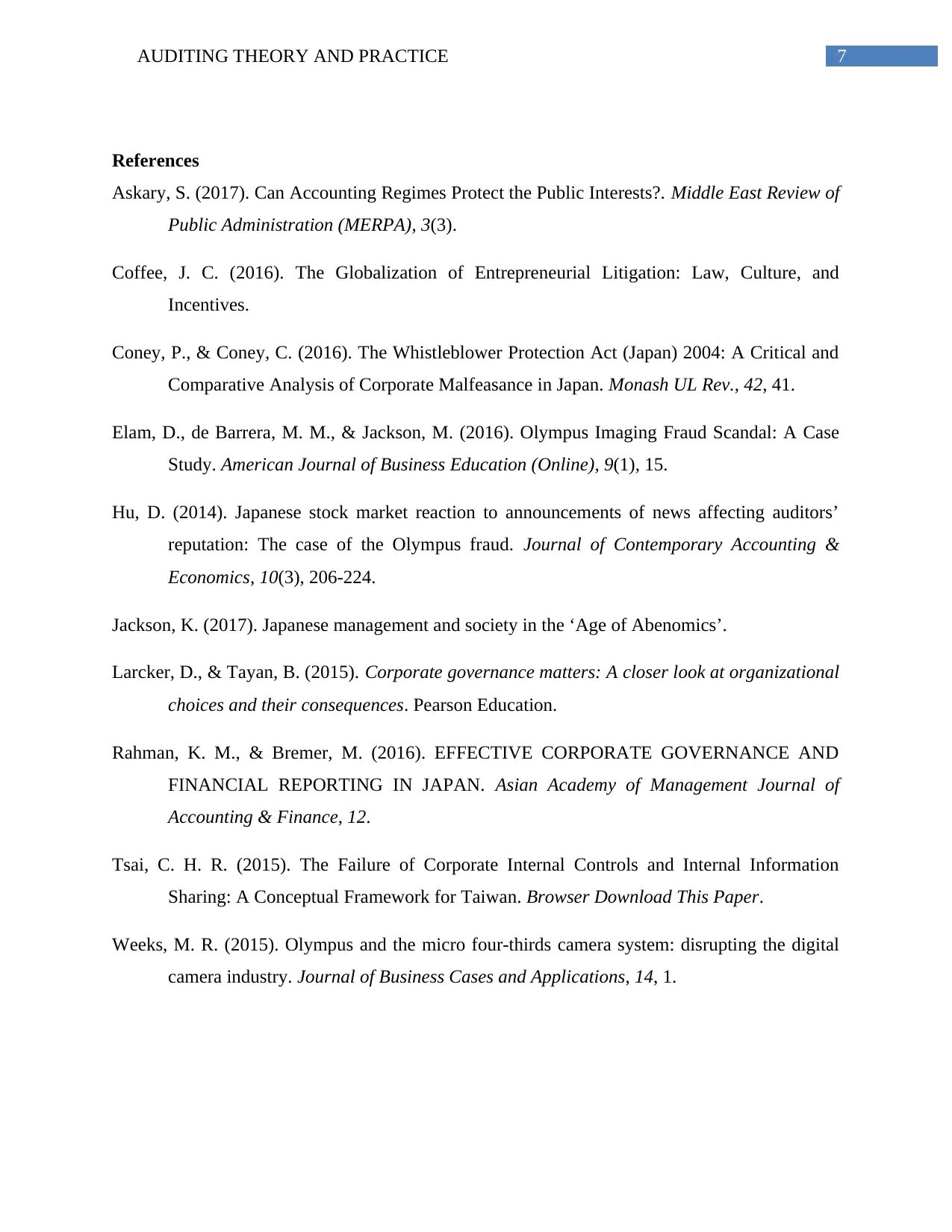
7AUDITING THEORY AND PRACTICE
References
Askary, S. (2017). Can Accounting Regimes Protect the Public Interests?. Middle East Review of
Public Administration (MERPA), 3(3).
Coffee, J. C. (2016). The Globalization of Entrepreneurial Litigation: Law, Culture, and
Incentives.
Coney, P., & Coney, C. (2016). The Whistleblower Protection Act (Japan) 2004: A Critical and
Comparative Analysis of Corporate Malfeasance in Japan. Monash UL Rev., 42, 41.
Elam, D., de Barrera, M. M., & Jackson, M. (2016). Olympus Imaging Fraud Scandal: A Case
Study. American Journal of Business Education (Online), 9(1), 15.
Hu, D. (2014). Japanese stock market reaction to announcements of news affecting auditors’
reputation: The case of the Olympus fraud. Journal of Contemporary Accounting &
Economics, 10(3), 206-224.
Jackson, K. (2017). Japanese management and society in the ‘Age of Abenomics’.
Larcker, D., & Tayan, B. (2015). Corporate governance matters: A closer look at organizational
choices and their consequences. Pearson Education.
Rahman, K. M., & Bremer, M. (2016). EFFECTIVE CORPORATE GOVERNANCE AND
FINANCIAL REPORTING IN JAPAN. Asian Academy of Management Journal of
Accounting & Finance, 12.
Tsai, C. H. R. (2015). The Failure of Corporate Internal Controls and Internal Information
Sharing: A Conceptual Framework for Taiwan. Browser Download This Paper.
Weeks, M. R. (2015). Olympus and the micro four-thirds camera system: disrupting the digital
camera industry. Journal of Business Cases and Applications, 14, 1.
References
Askary, S. (2017). Can Accounting Regimes Protect the Public Interests?. Middle East Review of
Public Administration (MERPA), 3(3).
Coffee, J. C. (2016). The Globalization of Entrepreneurial Litigation: Law, Culture, and
Incentives.
Coney, P., & Coney, C. (2016). The Whistleblower Protection Act (Japan) 2004: A Critical and
Comparative Analysis of Corporate Malfeasance in Japan. Monash UL Rev., 42, 41.
Elam, D., de Barrera, M. M., & Jackson, M. (2016). Olympus Imaging Fraud Scandal: A Case
Study. American Journal of Business Education (Online), 9(1), 15.
Hu, D. (2014). Japanese stock market reaction to announcements of news affecting auditors’
reputation: The case of the Olympus fraud. Journal of Contemporary Accounting &
Economics, 10(3), 206-224.
Jackson, K. (2017). Japanese management and society in the ‘Age of Abenomics’.
Larcker, D., & Tayan, B. (2015). Corporate governance matters: A closer look at organizational
choices and their consequences. Pearson Education.
Rahman, K. M., & Bremer, M. (2016). EFFECTIVE CORPORATE GOVERNANCE AND
FINANCIAL REPORTING IN JAPAN. Asian Academy of Management Journal of
Accounting & Finance, 12.
Tsai, C. H. R. (2015). The Failure of Corporate Internal Controls and Internal Information
Sharing: A Conceptual Framework for Taiwan. Browser Download This Paper.
Weeks, M. R. (2015). Olympus and the micro four-thirds camera system: disrupting the digital
camera industry. Journal of Business Cases and Applications, 14, 1.
1 out of 8
Related Documents
Your All-in-One AI-Powered Toolkit for Academic Success.
+13062052269
info@desklib.com
Available 24*7 on WhatsApp / Email
![[object Object]](/_next/static/media/star-bottom.7253800d.svg)
Unlock your academic potential
Copyright © 2020–2026 A2Z Services. All Rights Reserved. Developed and managed by ZUCOL.





